It’s Striking: Buyouts & The Washington Post
John Kelly — my friend, neighbor, and former editor on the Weekend section of The Washington Post –is taking a buyout.
“KISS just wrapped up its ‘final’ tour and I’m kicking off my farewell tour: I’m taking The Post buyout and will write my last column later this month,” John wrote on Facebook. “This column is just a windup to goodbye, where I ask readers how they made the transition from working to not-working.”
As a member of the Post’s first buyout class of 2004, I’ve been there, done that. And, I can attest that there is life after the Post. But this is another time, and this is a tough time with a shrinking news landscape.
It’s been a rough few weeks for my former colleagues at the Post where “Democracy Dies in Darkness” but also where “Democracy Dies in Layoffs.” Last Thursday, Post Guild members waged a 24-hour strike, which included picketing the paper’s headquarters on Franklin Square in downtown DC. I was proud to join them for a few rounds. Their bylines were missing from the day’s newspaper, with many stories credited only to “The Washington Post Staff.”
In 1974, we struck for two weeks but dared not picket the building, in deference to the printers, who were negotiating lifetime job guarantees (how quaint!) and would not cross. After two weeks of “withholding our excellence,” we accepted the paper’s last offer and returned to work. In the then acceptable ethnic joke of the day, our walkout was known as “the Polish strike.”
This time, at least, Post newsies could picket without worrying about the craft unions, who perform the tasks of production and distribution far from the newsroom. This time, they hoped, the world would notice, and their demonstration would amount to more than a fool’s errand.
On the line, I confirmed what I’d heard, that the Post planned to end all local columns. And the columnists? Gone, too. Local coverage in the Bezos Post has already declined and the entire social issues team and half the education reporters were also getting the ax — voluntarily, of course.
The Post, on track to lose $100 million this year, due to excessive spending by a former publisher, according to reports, has decreed a 240 staff reduction, with half coming from the newsroom. The buyouts are “voluntary,” unless the magic number isn’t reached, in which case layoffs will ensue. A third of the newsroom cuts are to come from the already depleted Metro staff.
In other words, due to management excesses, the staff, the coverage, and the readers, will suffer.
In January, the Post folded its Sunday magazine, laying off all 10 staffers, and eliminating its popular Second Glance feature. Pulitzer Prize-winning dance critic Sarah Kaufman was also let go. Gone, too, were Outlook, the Kids Post feature, and the Saturday op-ed Drawing Board, with its pointed editorial cartoons from elsewhere. The Style Invitational contest was eliminated, while Style’s promised makeover seemed limited to a new bold italic font for the section’s masthead. .
Ten more were laid off, bringing the total to 20 (one, I’m told managed to hang on, reducing the number to 19). Added to this were 21 more newsroom layoffs, bringing the 2023 total to 31. Severance for magazine staffers was 1.5 weeks of salary for each year of service, capped at 40 weeks, and one year of COBRA health insurance for those with 10 or more years of service.
Add to the 31 the larger round of 240 (half from the newsroom), and you get the bigger picture.
In late 2003, the Post’s offered its first newsroom buyout to staffers 55+ with at least 10 years of service. My package included two full years of pay (as a lump sum or rolled into a 401(k), a full pension (but no COLA), and a $5,000 health insurance cushion until Medicare age 65. There was no pressure to take it, but 56 of us did. The institutional memory walked out the door.
The Washington Post seemed genuinely sorry to see us go. The newspaper threw us a big retirement party and gave everyone a framed reprint of the paper’s front page from our first day of work.
Mike Getler, then the Post’s Ombudsman, a position abolished pre-Bezos, wrote an editorial page column titled “End of a Year, and Maybe an Era.” “Something big is affecting the lives of many people at The Post these days, and over time, it will affect readers,” he wrote.
The company was offering a “generous” buyout — far better than what is being offered (take it, or else) today. “It is going to be a large group with a thousand years of cumulative journalistic experience.” He listed several, including this shoe leather scribe. “Many on this list are not the high-profile writers of the big exclusives or series or narrative specials. Rather, they are they extremely knowledgeable beat reporters…” Getler concluded: “I’m sure The Post will continue to grow or buy the new talent it needs. But these energetic older folks will be missed.”
The Feb. 28, 2004 retirement party was memorable. “Behind Every Great Newspaper…” the cover of a small program said, and, inside: “…Are Heroes, Big and Small.” An inserted sheet heralded [The Washington Post Honors] and then listed all of our names. This year? Wait for it.
Ten years ago, in my Bethesda Magazine interview with then publisher Katharine Weymouth, the scion of the Graham family dynasty that relinquished ownership to Bezos optimistically cited the new owner’s “deep pockets.” “By itself, that’s not enough,” she added. “He is obsessively focused on the reader’s experience.” But which readers? And maybe not so obsessively.
Bezos, whose net worth is estimated at $171 billion, has an enormous yacht, which reportedly cost him about $500 million to build — too big to anchor with the run-of-the-mill luxe pleasure craft berthed in Port Everglades, Florida. Moving from Seattle, where he’d lived since 1994, Bezos also purchased two mansions, for $68 million and $79 million, according to Bloomberg News.
After our disastrous strike almost a half century ago, things went from bad to worse. In October 1975, the pressmen went out on strike, after torching some presses and beating up a foreman. The Guild then had a comfortable “union security” clause, under which 8 of 10 employees had to join or pay dues. Taken for granted, the newsroom knew nothing of the fierce battles waging inside the building between labor and management, and the pressmen’s strike deeply divided our unit.
My work-in-progress memoir, currently on indefinite sabbatical, includes a chapter I have called “Solidarity (Almost) Forever.”
It is a long, sad story. At first, an overwhelming majority in the newsroom — myself among them — voted to cross the pressmen’s picket line. Then, as we learned more, my sympathies changed but I felt bound by the unit’s majority vote, then supported the strike from the inside, if that makes any sense. Some newsroom members crossed, others didn’t. There was still a slim majority to continue working, even after a third vote following Katharine Graham’s decision to hire “replacement workers” to operate the presses and break the pressmen’s union.
The Washington-Baltimore Local 35 filed charges against us; we hired lawyers to defend ourselves. The international Guild weighed in. The charges were dismissed. Then, an “independent” company union emerged to challenge the Guild’s right to represent us. The international brought in all its top guns, and the Guild prevailed; it was a pyrrhic victory. So many members had resigned, and we were without a contract for three-and-one-half years.
Out of this morass, I somehow rose (if that is the right word) to be the Unit Chair in 1978. We mounted membership drives (“Join the Guild. You Can’t Afford Not To!”), welcomed new and returning members, held a rally out front armed with a bluegrass band and a telegram of support from actor Ed Asner (“Lou Grant,” the crusty city editor in 1977-1982 TV series of that name), hand collected dues and produced mocking buttons: Unmanageable Free Spirit, what Post management said it didn’t want in the newsroom, and Be Union Chic, after Executive Editor Ben Bradlee noted that one of our most “chic” female members had become a shop steward. We even held a Washington Post Guild Unit Film Festival, which we called WP-GUFF.
We had been the Newspaper Guild’s flagship unit. But our top minimum salaries had gone from #1 among newspapers represented by the union to #29.
Eventually, we settled for a really bad contract, but at least we had one. The hard lesson of our hard times was that a union is only as good as its members and their willingness to be active in it.
I am happy to say that the Post Guild today is stronger than ever, with some 75% of the 1000-member unit supporting the union with their dues and energy. All of that was in evidence in front of the Post on Thursday, Dec. 7, 2023, a date to remember and in this case also to celebrate.
Then…
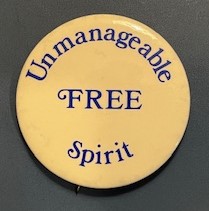
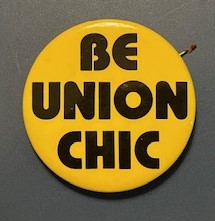
Now…
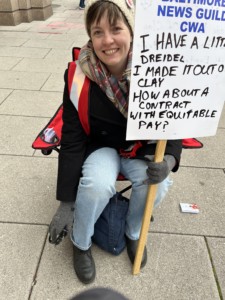
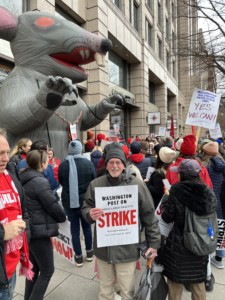
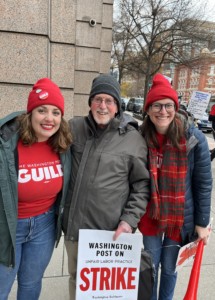
Thanks. As usual, your post is very informative and very interesting. I regret to say that I meant to forego Miss Manners and the Addicting Crosswords, but I forgot until I saw something about it the next day. I was there in spirit (only). Nevertheless, thanks again.
Thanks for this reporting and your valuable perspective, Gene.
“We’ll always have Upper Marlboro.”
Thumbs up!
Your column is a portrait of how a great newspaper is driven into the ground. The latest chapter with a billionaire at the helm shows how off course everything is. And watching Mayor Bowser today in the face of more gazillionaires trying to take two premium sports teams out of DC is another example. Good grief.
Sad all around. When I was 17 the biggest restaurant in my small town went out of business and told staff/management by padlocking the door. I left for college in search of a career. 10 years into employment, my entire division was laid off with not enough severance to help. People had been there 20 years, most of which without cost of living increases. my next job lasted 18 months before I was laid off, with good severance at least. I’ve been laid off a few more times since. Greenspan got it right when he called the 2000s the Age of Turbulence. Being capable, talented, and willing isn’t enough anymore. I wonder what’s next.
Thanks for writing. I wish I had the answers. All I can do is tell the story as best I can.
Thanks for the look back…very informative to have your perspective. I really hate to imagine the future without a Post that cares about the DMV, but that’s what is unfolding… Keep it up!